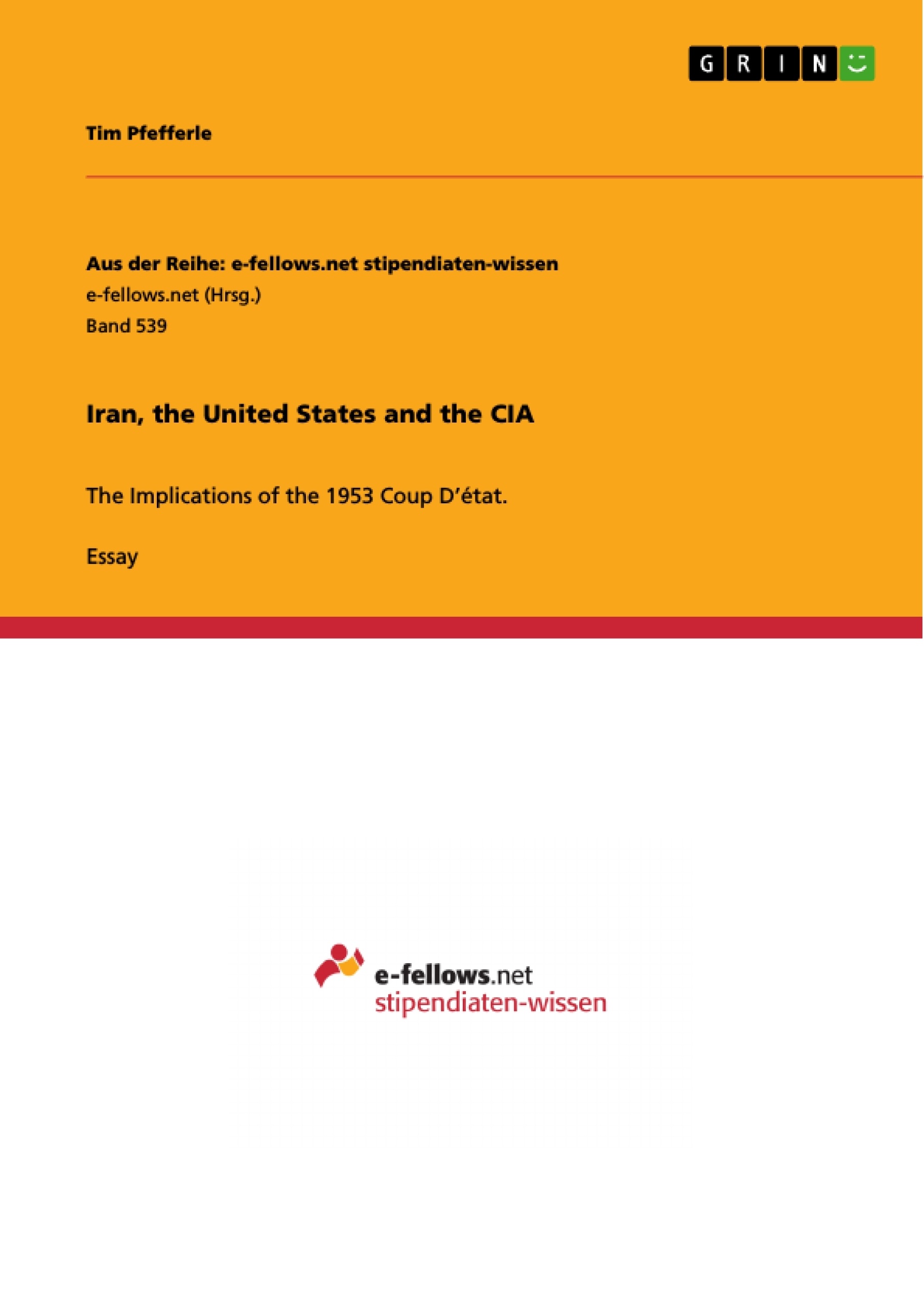This research paper will analyze the events of mid-August, 1953, during which the CIA conducted a clandestine coup d’etat do remove the democratically elected prime minister of Iran, Mohammad Mossadegh from office and install a more pro-Western regime. The essay will give equal attention to agency and structure, providing an analysis of crucial characters such as Kermit Roosevelt, Shah Mohammed Reza Pahlavi and Mohammed Mossadegh himself, as well as an investigation into the structural underpinnings, which include the Cold War background and Iranian oil resources. Three key implications will be outlined. First, the direct effect on Iran’s domestic situation will be delineated. Secondly, the successful 1953 coup will be highlighted as the dawn of more active CIA involvement in the conduct of US foreign policy. Lastly, the coup’s implications for the United States’ image and scope for policy-making in the Middle East will be analyzed, taking into account its role as a catalyst for the 1978-9 Iranian Revolution and subsequent installment of an Islamic regime.
Inhaltsverzeichnis (Table of Contents)
- Introduction
- The historical context
- The Audacity of Perseverance: The Revival of the Coup and Mossadegh's Fall
Zielsetzung und Themenschwerpunkte (Objectives and Key Themes)
This essay examines the 1953 CIA-backed coup in Iran, focusing on the events of August 16th-19th, 1953, when a second attempt to depose the Iranian government was successful. It analyzes the impact of this coup on Iran's political landscape, the role of the CIA in US foreign policy, and the long-term consequences for US-Iran relations.
- The immediate and long-term consequences of the coup for Iran
- The CIA's role in US foreign policy implementation and the debate surrounding its influence
- The significance of the coup as a turning point in US foreign policy in the Middle East
- The role of various actors, including the Tudeh Party, in the events leading to the coup
- The manipulation of information and public perception by the CIA and its allies
Zusammenfassung der Kapitel (Chapter Summaries)
- Introduction: The essay sets the stage by highlighting the troubled relationship between Iran, the US, and Israel, referencing the 1953 coup as a pivotal moment in this history. It introduces the central thesis: the 1953 coup had profound implications for Iran, the CIA, and US foreign policy in the Middle East.
- The historical context: This section provides a brief overview of the events leading up to the 1953 coup, including the discovery of oil in Persia, the British oil concession, and the rise of Iranian nationalism under Mohammad Mossadegh, culminating in the nationalization of the Anglo-Iranian Oil Company in 1951. It details the economic sanctions imposed by the UK and the escalating tensions between Iran and the UK.
- The Audacity of Perseverance: The Revival of the Coup and Mossadegh's Fall: This section delves into the events of August 16th-19th, 1953, when the CIA, under Kermit Roosevelt Jr., and General Zahedi revived the coup plan after its initial failure. It describes the tactics employed, including the manipulation of the media, public opinion, and the use of mobs and bribes. It also highlights the role of the Tudeh Party and the growing instability in Tehran.
Schlüsselwörter (Keywords)
This preview centers on the 1953 Iranian coup, highlighting key figures like Kermit Roosevelt Jr., Mohammad Mossadegh, and General Zahedi. It explores themes of US foreign policy, the CIA's role in shaping global events, and the lasting impact of the coup on the US-Iran relationship. It examines the relationship between imperialism and nationalism, the manipulation of public opinion, and the role of the Tudeh Party in the events of 1953.
Frequently Asked Questions
What was the 1953 Iranian coup?
The 1953 Iranian coup was a clandestine operation backed by the CIA and the UK to overthrow the democratically elected Prime Minister Mohammad Mossadegh and consolidate the power of Shah Mohammad Reza Pahlavi.
Why did the CIA intervene in Iran in 1953?
The primary reasons were the nationalization of the Anglo-Iranian Oil Company by Mossadegh, which threatened Western oil interests, and Cold War fears that Iran might align with the Soviet Union.
Who were the key figures in the coup?
Crucial actors included Kermit Roosevelt Jr. (the CIA operative leading the mission), Prime Minister Mohammad Mossadegh, Shah Mohammad Reza Pahlavi, and General Zahedi.
How did the coup affect long-term US-Iran relations?
The coup is seen as a catalyst for the 1979 Iranian Revolution. It created deep-seated resentment toward US interventionism, leading to the eventual installment of the Islamic regime and ongoing diplomatic tensions.
What tactics did the CIA use during the operation?
Tactics included the manipulation of the media, bribing officials, organizing staged protests (mobs), and psychological warfare to undermine Mossadegh's public support.
- Quote paper
- Tim Pfefferle (Author), 2012, Iran, the United States and the CIA, Munich, GRIN Verlag, https://www.grin.com/document/202453



